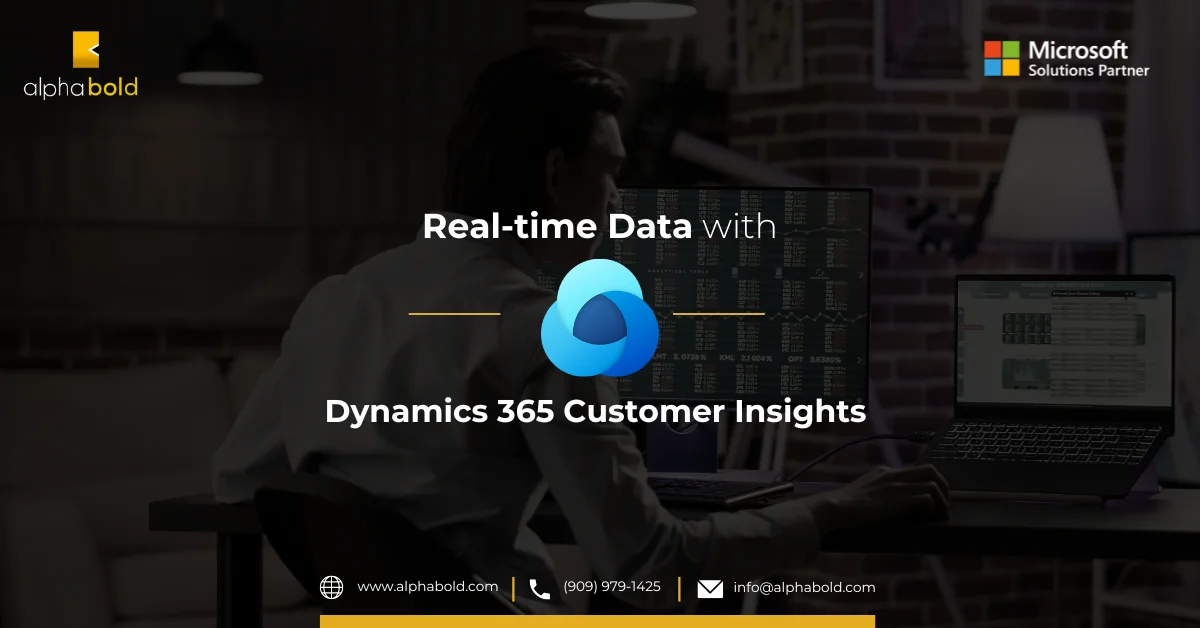Things CFOs Should Consider Before Approving Budget for Dynamics 365 Customer Engagement Project

Tayyab Ali
Introduction
As a Chief Financial Officer (CFO), your expertise in financial oversight is pivotal for steering company investments towards success. In the realm of digital transformation, specifically when deliberating over a Dynamics 365 Customer Engagement implementation, your role transcends traditional fiscal responsibilities. This article aims to guide CFOs through the intricate landscape of budgeting for Dynamics 365 Customer Engagement solutions. It addresses critical financial considerations, explores the integration impact on ROI, and delves into the strategic benefits of leveraging this robust CRM platform for enhanced customer relationships. We’ll also discuss how Dynamics 365 Customer Engagement, as a comprehensive customer relationship management solution, aligns with broader organizational goals, offering insights into effective budget allocation and long-term financial planning.
Critical Considerations for CFOs in Dynamics 365 Customer Engagement Projects
1. Return on Investment (ROI):
One of the most important considerations when approving a Dynamics 365 Customer Engagement project budget is the potential return on investment (ROI). This could include factors such as increased productivity, improved customer satisfaction, and reduced costs. It is important to carefully assess the potential ROI of the project and ensure that it is a cost-effective investment.
2. Total Cost of Ownership (TCO):
In addition to the upfront cost of implementing a Dynamics 365 Customer Engagement project, it is important to consider ongoing costs such as training, support, and maintenance. These ongoing costs can significantly impact the project’s total cost of ownership (TCO). A CFO should assess the TCO over the project’s lifetime to ensure it is a cost-effective investment.
3. Resource Allocation:
A Dynamics 365 Customer Engagement project will require a range of resources, including staff time, hardware and software, and other expenses. It is important to ensure that these resources are available and that the project is feasible within the budget. A CFO should carefully assess the project’s resource requirements and determine whether they are realistic within the available budget and resources.
4. Implementation Timeline:
5. Alternative Solutions:
Before approving a budget for a Dynamics 365 Customer Engagement project, a CFO should consider any alternative solutions that may be available, such as other customer relationship management(CRM) software platforms or customized solutions. It is important to compare the costs and benefits of these options and determine which solution is the most cost-effective for the organization.
6. Integration with Existing Systems:
7. Customization and Scalability:
8. Support and Maintenance:
9. Security and Compliance:
A Dynamics 365 Customer Engagement project may be subject to security and compliance risks, such as that of data breaches or non-compliance with relevant regulations. It is important to carefully assess these risks and ensure appropriate measures are in place to protect sensitive data and meet relevant regulatory requirements.
10. Potential Risks:
Many potential risks may be associated with a Dynamics 365 Customer Engagement project, such as project delays or budget overruns. It is important to consider these risks carefully and have contingency plans to mitigate their impact. A CFO should consider the potential risks and ensure that the organization is prepared to handle them. Here are some important things to consider:
- Technical risks: There may be technical risks associated with implementing a Dynamics 365 Customer Engagement project, such as data loss or downtime during the implementation process. It is important to carefully assess these risks and have contingency plans to minimize the impact on business operations.
- Change management risks: A Dynamics 365 Customer Engagement project may require significant changes to business processes, systems, and organizational structures. It is important to consider the potential impact of these changes on employees and stakeholders and to have the plan to manage and mitigate any potential risks.
- Resource constraints: A Dynamics 365 Customer Engagement project may require significant resources, including staff time, hardware and software, and other expenses. It is important to consider whether the organization has the necessary resources to support the project and whether it is feasible within the available budget.
- Legal and regulatory risks: A Dynamics 365 Customer Engagement project may be subject to legal and regulatory requirements, such as data privacy laws and industry-specific regulations. It is important to carefully assess these risks and ensure that the project complies with all relevant regulations.
- Market risks: The market environment in which a Dynamics 365 Customer Engagement project is being implemented may change over time, which can impact the project’s viability and return on investment. It is important to consider market risks and have contingency plans to mitigate the impact of any potential changes.
Explore Success Story: Working as a team amidst disruption at the University of South Florida
Considering these key factors, a CFO can make an informed decision about approving a budget for a Dynamics 365 Customer Engagement project. By carefully evaluating the costs and benefits of the project, a CFO can ensure that the organization is making a cost-effective investment that aligns with its long-term goals and objectives.
Further Reading: Assessing Your Business Needs for Dynamics 365
Ready to Optimize your Dynamics 365 Customer Engagement Strategy?
Unlock the full potential of Microsoft Dynamics 365 with AlphaBOLD's expert guidance. Let us help you transform your business interactions and drive growth.
Request a ConsultationEvaluating the Need for a Dynamics 365 Implementation Partner: Insights for CFOs
When deciding whether to introduce Dynamics 365 Customer Engagement into your business ecosystem, the decision of whether to collaborate with a specialized implementation partner is pivotal. For CFOs, this choice isn’t just about delegating tasks; it’s a strategic move that can significantly influence the project’s success and ROI.
- Understanding the Complexity of Dynamics 365 Implementations: Dynamics 365, with its extensive capabilities in customer relationship management, is not just a software purchase; it’s an organizational change. The complexity lies not only in its technical implementation but also in aligning it with your company’s financial strategies and goals.
- The Value of Expertise: A certified Dynamics 365 partner brings to the table a depth of knowledge and experience. They are well-versed in best practices, common pitfalls, and industry-specific configurations. This expertise can be crucial in navigating the financial and technical challenges of the project, ensuring a smoother, more effective implementation and integration.
- Cost-Benefit Analysis: One of the core responsibilities of a CFO is to conduct a thorough cost-benefit analysis. While partnering might seem like an added expense, it’s essential to weigh this against the potential costs of extended timelines, technical issues, or suboptimal usage due to in-house implementation challenges.
- Risk Mitigation and Compliance: Dynamics 365 partners are not only tech experts; they also understand the legal and compliance aspects relevant to different industries. Their involvement can mitigate risks related to data security, regulatory compliance, and system integrity, safeguarding your organization against potential legal and financial pitfalls.
- Long-Term Strategic Partnership: Choosing the right Dynamics 365 partner isn’t just about the immediate implementation. It’s about forming a long-term strategic relationship. The right partner can provide ongoing support, training, and updates, ensuring that your Dynamics 365 system evolves in line with your business.
Read on: Coca-Cola Beverages Africa streamlines its operations with Microsoft solutions
The Impact on Budgeting:
Deciding to partner with a Dynamics 365 implementation specialist has significant implications for your budgeting strategy. This decision transcends the initial cost analysis, influencing long-term financial planning in several ways:
- Upfront Investment vs. Long-Term Savings: While engaging a partner involves an upfront cost, it can lead to substantial long-term savings. Partners can streamline the implementation process, reducing costly delays and potential overruns that often accompany in-house implementations without specialized knowledge.
- Predictable Expense Planning: Working with a partner can transform unpredictable costs into a more predictable expense model. They can offer fixed-price contracts or clear estimates based on their experience, enabling CFOs to budget more accurately and avoid unexpected expenses.
- Operational Efficiency Gains: A partner’s expertise can significantly shorten the time to go live, meaning quicker operational efficiency gains. This efficiency translates into faster ROI, impacting the overall financial health of the company positively.
- Resource Allocation Optimization: With a partner managing the Dynamics 365 implementation, internal resources can be better allocated to core business activities. This efficient resource utilization can lead to cost savings and enhanced productivity.
- Mitigating Risk of Costly Errors: A partner’s experience in ensuring compliance and data security can prevent potential legal and financial repercussions, which might result from non-compliance or data breaches, especially in highly regulated industries.
Essential Budgeting Queries for Your Dynamics 365 Partner Evaluation
Choosing the right Dynamics 365 partner is a critical decision that directly impacts your project’s budget and overall success. To ensure financial clarity and alignment with your organization’s objectives, here are essential questions to discuss with your potential Dynamics 365 partner:
- Detailed Cost Breakdown: Can you provide a comprehensive breakdown of all costs associated with the Dynamics 365 implementation, including licensing, customization, integration, and support services?
- Transparency in Pricing: Are there any hidden costs or potential additional charges that might arise during or after the implementation process?
- ROI Estimation: How do you estimate the return on investment for a Dynamics 365 Customer Engagement project? Can you provide examples or case studies from similar implementations?
- Payment and Financing Options: What are the available payment terms and structures? Do you offer any flexible financing options that can accommodate our budget constraints?
- Customization and Scalability Costs: How do customization and scalability impact the overall cost? Are future upgrades or changes included in the initial pricing, or do they incur additional charges?
- Integration with Existing Systems: What are the costs and challenges associated with integrating Dynamics 365 with our existing systems and infrastructure?
- Ongoing Maintenance and Support Fees: What are the ongoing costs for maintenance and support post-implementation? Are there different tiers of support, and how do they differ in terms of cost and service level?
- Training and User Adoption: What is the cost for training our team on Dynamics 365, and what type of training programs do you offer?
- Timeline and Resource Allocation: How will the project timeline and resource allocation affect the overall budget? Are there any cost implications for delays or expedited implementation?
- Compliance and Security Costs: Are there any additional costs for ensuring the system complies with our industry regulations and data security standards?
By asking these questions, you can gain a clearer understanding of the financial aspects of your Dynamics 365 Customer Engagement project. This will help in making an informed decision, ensuring the project aligns with your financial goals and delivers the intended value to your organization.
Further Reading: Why Work With a Partner on Dynamics 365 Implementation?
Ready to Maximize your CRM Investment?
Unlock the full potential of Microsoft Dynamics 365 for superior customer interactions. Trust AlphaBOLD’s experts to lead you through successful budgeting and implementation.
Request a ConsultationConclusion
In conclusion, the role of a CFO in guiding an organization through the adoption of Dynamics 365 Customer Engagement encompasses a broad spectrum of strategic considerations. From evaluating the potential return on investment to understanding the total cost of ownership, each aspect plays a vital role in making an informed decision. The necessity of resource allocation, the criticality of the implementation timeline, and the importance of exploring alternative CRM solutions are pivotal elements that contribute to the financial viability of the project.
Additionally, the integration with existing systems, the potential for customization and scalability, and the necessity for robust support and maintenance further underscore the importance of a comprehensive evaluation. Security and compliance remain at the forefront of these considerations, ensuring that the chosen solution not only enhances customer engagement but also aligns with legal and industry standards.
The decision to partner with a Dynamics 365 implementation specialist is more than a mere operational choice; it’s a strategic investment that influences long-term financial planning and operational efficiency. This blog has aimed to equip CFOs with critical insights and essential questions to ask potential partners, thereby enabling them to navigate the complexities of Dynamics 365 Customer Engagement with confidence and financial acumen. By meticulously assessing these factors, CFOs can ensure that their organization makes a cost-effective and strategically sound investment, aligning with long-term goals and objectives in the ever-evolving landscape of customer relationship management.







